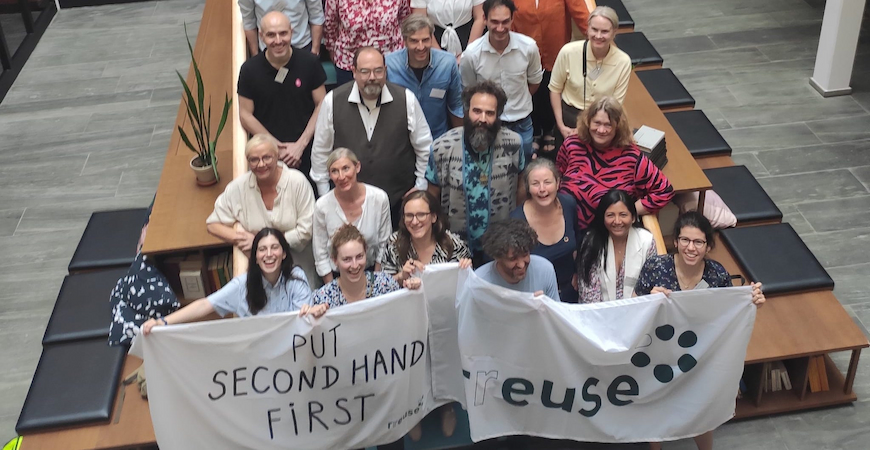Knitting together a social and circular future for textiles
An interview with Yvette Gumbs, the national delegate for the Netherlands. Yvette represented Emmaus Europe at the conference organised by RREUSE on the urgent topic of textile waste and the impact that this has on the fashion industry.
Let’s get started by talking about the current challenges in the textile market. What do you think are the main problems we are currently facing with regards to the textile industry?
The textile market is facing significant challenges in terms of sustainability and waste management. One of the main problems is the linear nature of this industry: textiles are produced, used and then thrown away at breakneck speed. Thus huge amounts of textile waste are produced and a significant proportion of these textiles end up being sent for incineration or to landfill sites.
Another challenge is the social impact of the textile industry, especially in manufacturing for fast fashion. In several regions across the globe working conditions are poor, wages are low and workers’ rights are often violated. We must solve these problems in order to build a fair and sustainable future for the textile sector.
Given the complexity of these challenges, how can we move towards a more circular and responsible textile industry in terms of its social impact?
The transition towards a more circular and socially-responsible textile industry requires a multifaceted approach with the involvement of several stakeholders. First of all we must promote the adoption of more circular and socially-oriented business models amongst textile producers. They may need to focus on producing less in order to produce better as well as implementing new practices such as repairing items and taking into account the end of life when designing pieces.
Furthermore, consumers themselves play a key role in this transition. It is essential that we raise awareness about the consequences of fast fashion and that we encourage people to adopt more responsible behaviours such as purchasing second-hand clothing or renting clothing. Consumers may also decide to support sustainable brands that have adopted more ethical and environmentally-friendly practices.
Lastly, political decision-makers should encourage the adoption of sustainable practices by implementing legislation that limits the importing of products that are produced under sub-standard social and environmental norms as well as legislation that encourages reuse – by making Extended Producer Responsibility compulsory and by rewarding companies that take initiatives in order to protect the environment.
Extended Producer Responsibility (ERP) is a political tool that extends the financial and/or operational responsibility of a producer in order to include the management of the post-consumption phase for the product in question. The aim of this mechanism is to help us to reach our national and European objectives for recycling and waste diversion. Furthermore, ERP policies generally transfer the costs (either partially or fully) of waste management, and of the physical collection of waste items, from local authorities to the producers.
As regards textile reuse, have you come across any innovative solutions? Are any of the solutions promising in terms of reducing textile waste?
There are many exciting, innovative solutions in textile reuse that have a lot of potential. One such solution is technologies that recycle old pieces of textile into new fibres that can then be used to create new pieces. This solution helps to reduce our needs for new materials as well as reducing both waste and energy consumption.
Another great solution is the emergence of collaborative platforms. Such platforms facilitate the trading and renting of clothing as well as boosting the second-hand market. These platforms thus promote a culture of reuse for clothing, instead of simply throwing pieces away after they have been worn a few times.
Furthermore, social enterprises and NGOs like Emmaus have made significant progress in promoting reuse practices thanks to initiatives based on skills development and upcycling. Communities are thus able to create value from textiles that had been thrown away, and this then has an economic and social impact within the groups.

Conference organised by RREUSE 22-23 June 2023, Berlin. © RREUSE



